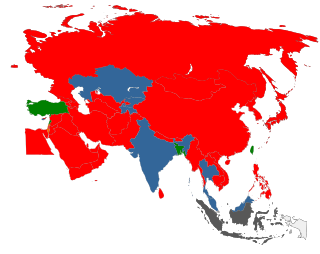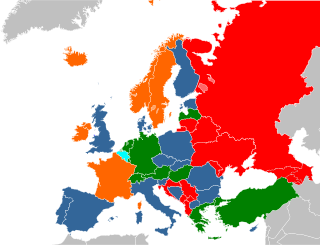Related Research Articles
Child sex tourism (CST) is tourism for the purpose of engaging in the prostitution of children, which is commercially facilitated child sexual abuse. The definition of child in the United Nations Convention on the Rights of the Child is "every human being below the age of 18 years". Child sex tourism results in both mental and physical consequences for the exploited children, which may include sexually transmitted infections, "drug addiction, pregnancy, malnutrition, social ostracism, and death", according to the State Department of the United States. Child sex tourism, part of the multibillion-dollar global sex tourism industry, is a form of child prostitution within the wider issue of commercial sexual exploitation of children. Child sex tourism victimizes approximately 2 million children around the world. The children who perform as prostitutes in the child sex tourism trade often have been lured or abducted into sexual slavery.

The legality of prostitution in Asia varies by country. There is often a significant difference in Asia between prostitution laws and the practice of prostitution. In 2011, the Asian Commission on AIDS estimated there were 10 million sex workers in Asia and 75 million male customers.

The age of consent in Africa for sexual activity varies by jurisdiction across the continent, codified in laws which may also stipulate the specific activities that are permitted or the gender of participants for different ages. Other variables may exist, such as close-in-age exemptions.
Prostitution in Senegal is legal and regulated. Senegal has the distinction of being one of the few countries in Africa to legalize prostitution, and the only one to legally regulate it. The only condition that it is done discreetly. Prostitution was first legalised in 1966. UNAIDS estimate that there are over 20,000 prostitutes in the country. The average age for a sex worker in Senegal is 28 years old and female.
Prostitution in Romania is not itself criminalized, although associated activities, such as procuring, are criminal offenses, and solicitation is a contravention punishable by fines.
Prostitution in Georgia is illegal but widespread, particularly in the capital, Tbilisi. Many NGO's attribute this to the harsh economic conditions according to the US State Department. Prostitution occurs on the streets, in bars, nightclubs, hotels and brothels. UNAIDS estimate there are 6,525 prostitutes in Georgia.
Prostitution in Panama is legal and regulated. Prostitutes are required to register and carry identification cards. However, the majority of prostitutes are not registered. There are 2,650 sex workers registered with the government in 2008, but there was no accurate information regarding the total number of persons practising prostitution in the country. Some estimate put the number of unregistered prostitutes at 4,000.

Prostitution is legal and regulated in Bangladesh. Prostitutes must register and state an affidavit stating that they are entering prostitution of their own free choice and that they are unable to find any other work. Bangladeshi prostitutes often suffer poor social conditions and are frequently socially degraded.
Prostitution in Cameroon is illegal but tolerated, especially in urban and tourist areas. In the capital, Yaoundé the main area of prostitution is the neighbourhood of Mini Ferme. UNAIDS estimate there are 112,000 sex workers in the country.

The legality of prostitution in Europe varies by country.
Prostitution in Azerbaijan is illegal but common. Prostitution is an administrative offence and punishable by a fine. Keeping a brothel is a criminal offence and punishable by up to 6 years' imprisonment. In 2017 a draft law proposing to add heavy fines to the punishment for keeping a brothel was before the National Assembly. It has been estimated that there are 25,054 prostitutes in Azerbaijan, some of which are aged 15 to 18.
Prostitution in Bulgaria is itself legal, but organised prostitution brothels, prostitution rings, or other forms of procuring prostitution procuring are prohibited. In the past, the Bulgarian government considered fully legalising and regulating prostitution.
Prostitution in Croatia is illegal but common. Forcible prostitution, any kind of brothels, or procuring are treated as a felony, while voluntary prostitution is considered to be infraction against public order. Like in many other Southeast European countries, the problem of human trafficking for the purposes of sex is big in Croatia.
Same-sex unions have been recognised in the microstate of Monaco since 27 June 2020. On 4 December 2019, the National Council passed a bill establishing cohabitation agreements, offering both same-sex and opposite-sex couples limited rights and benefits in the areas of inheritance and property. The law took effect on 27 June.
Prostitution in Rwanda is illegal in all aspects. Prostitutes, clients and any involved third parties are criminalised by the country's Penal Code. However, a draft of a new Penal Code that does not prohibit prostitution was presented for debate in the Rwandan Parliament in December 2017.
Prostitution in Kosovo is illegal, and can incur a prison sentence of up to sixty days. The Global Fund to Fight AIDS, Tuberculosis and Malaria's HIV Program in Kosovo estimated there to be 5,037 prostitutes in the country. Many women turn to prostitution through poverty.

Finland is a transit, destination, and a limited source country for women, men and girls subjected to forced marriage, forced labor and sex trafficking. Finnish legislation condemns trafficking as a crime and has met the standards of the EU Protocol even before the convention came into effect. NGOs and the government cooperate in providing help for the victims of trafficking in Finland. Although the Finnish Police investigated and referred more people to care in 2013, prosecution and conviction numbers of suspected offenders remain low relative to the number of potential victims. The government is currently working on improving the anti-trafficking laws and practices to improve the situation. U.S. State Department's Office to Monitor and Combat Trafficking in Persons placed the country in "Tier 1" in 2017.
Prostitution in Benin is legal but related activities such as brothel keeping and benefiting from the prostitution of others are illegal. UNAIDS estimates there to be about 15,000 prostitutes in the country. Most of these are migrants from neighbouring countries, mainly Nigeria, Togo and Ghana. Only 15% of the prostitutes are Beninese. Prostitution occurs on the streets, in bars, restaurants, hotels and brothels. With advent of the smartphone, many prostitutes use apps to make arrangements with clients.
Prostitution in Cape Verde is legal and commonplace. There are no prostitution laws on the islands except for those concerning trafficking and child prostitution. UNAIDS estimate there are 1,400 prostitutes in Cape Verde, and many were from Ghana and Senegal before being expelled by the police. Some turn to prostitution through poverty.
The Islamic Republic of Iran signed the UN Convention on the Rights of the Child (CRC) in 1991 and ratified it in 1994. Upon ratification, Iran made the following reservation: "If the text of the Convention is or becomes incompatible with the domestic laws and Islamic standards at any time or in any case, the Government of the Islamic Republic shall not abide by it."
References
- ↑ "Monaco - Country Reports on Human Rights Practices". U.S. Department of State. 26 February 2004. Retrieved 1 August 2018.
- 1 2 3 4 "Prostitution?: Pas de sanction pour les clients". Monaco Hebdo. 2011-05-24. Archived from the original on 2014-10-29. Retrieved 2014-10-29.
- 1 2 "Committee on the Elimination of Discrimination against Women reviews the situation of women in Monaco". United Nations. 9 November 2017. Retrieved 17 December 2017.
- ↑ Schlegel, Jean-Louis (2008). "Psychodrame chez les provos. Siné Hebdo contre Charlie Hebdo". Esprit. Octobre (10): 213–217. doi:10.3917/espri.0810.0213. ISSN 0014-0759.
- ↑ "LégiMonaco - Code Pénal - Article 268". www.legimonaco.mc. Retrieved 2 August 2018.
- 1 2 "LégiMonaco - Code Pénal - Article 269". www.legimonaco.mc. Retrieved 2 August 2018.
- ↑ "LégiMonaco - Code Pénal - Article 265". www.legimonaco.mc. Retrieved 2 August 2018.
- ↑ "LégiMonaco - Code Pénal - Article 269-1". www.legimonaco.mc. Retrieved 2 August 2018.
- ↑ "LégiMonaco - Code Pénal - Article 276". www.legimonaco.mc. Retrieved 2 August 2018.
- ↑ "LégiMonaco - Code Pénal - Article 273". www.legimonaco.mc. Retrieved 2 August 2018.
- ↑ "Monaco 2016 Country Reports on Human Rights Practices". US Department of State. 3 March 2017. Archived from the original on 7 March 2017. Retrieved 17 December 2017.
- ↑ "Consideration of reports submitted by States parties under article 44 of the Convention - Monaco" (PDF). UN Convention on the Rights of the Child. 28 June 2010. Retrieved 1 August 2018.
- ↑ Tully, Stephen (2005). "UN: Convention for the Suppression of the Traffic in Persons and of the Exploitation of the Prostitution of Others, 1949". In Tully, Stephen (ed.). doi:10.4337/9781845428297.00118. ISBN 9781845428297.
{{cite book}}:|journal=ignored (help); Missing or empty|title=(help)